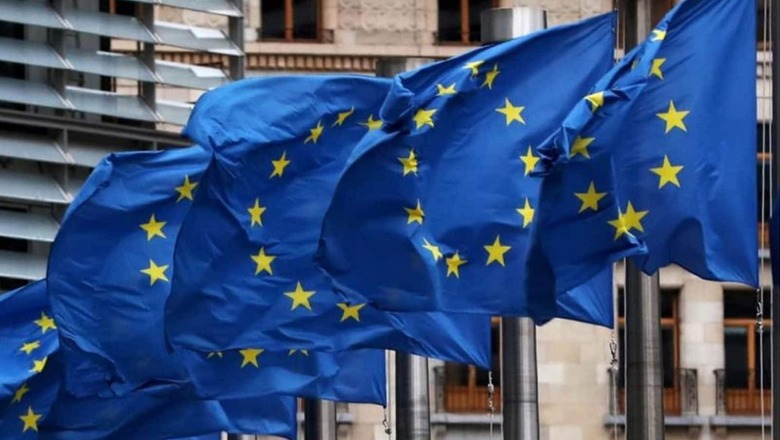
views
Germany’s Navy chief had to resign this week. Resign because he publicly (or possibly indiscreetly) gave away a line we’ve been hearing from the Germans, French and Italians for a while now, echoing Samuel P. Huntington’s “clash of civilisations” — where Christian Europe and in some iterations Christendom stands against the others. This has been a dirty secret for quite sometime — something that western commentators like to brush off as somehow irrelevant. Yet their own record tells us a lot about religion being alive and kicking in their policies, well into the 21st century.
There were three things in particular that Kay-Achim Schönbach, then head of the German Navy, said at a conference in New Delhi. Each of these drew criticism. The first was about Crimea being lost and Putin looking for respect. The second was about how Christian countries shouldn’t be fighting each other. The third was that when a bellicose (presumably non-Christian) China is on the rise, the Christian West needs allies. It is this third point that is most interesting and has always been an underlying factor in foreign and domestic European policy.
Let’s take this back to the staunchest secularist among them — France. The country has a history of anti-clericalism and is against public display of religiosity. When in 2004 a whole range of religious gear was banned from public schools — including upsettingly for Sikhs, the turban — one item was exempt, small crucifixes because apparently they were “fashion statements”. Later, Manmohan Singh’s government that took up the issue with the French were politely told that “kesh” (hair) was a fundamental requirement of Sikhism not “pagdi” (turban), and that the ban was on turbans and not hair.
Of course at that point, it didn’t strike Indian interlocutors or the French-Sikh community to claim that multi-coloured or polka-dotted turbans were “fashion statements” like small crosses and they went on about how the religious necessity arose from the “rehat maryada” and not the Guru Granth Sahib.
Similarly, when the debate in France was about covering the head, the legislation focused merely on face coverings — on the grounds that this was critical from a facial recognition point of view. Needless to say, nuns who do wear a hijab of sorts were exempted in the final legislation but hijabis who cover their faces were not. France is a classic case where rules are bent very smartly and subtly to not affect Christianity but affect everyone else, and in many ways this is the EU’s policy.
Now let’s extrapolate this to foreign policy. Ever noticed that every single member of the EU is a Christian country? The four countries in Europe that have majority Muslim population (Turkey, Bosnia, Kosovo and Albania) have been actively denied entry or their request kept pending ad infinitum. Of course the official reason is corruption, lack of fiscal discipline etc. etc., but the reality has always been Christianity — a message that came out loud and clear when Turkey’s bid to join EU was rejected, with the Pope and the powerful lobbies opposing it publicly.
So how do we read the West’s actions with regard to Serbia, a Christian country that it bombed to protect a Muslim minority? As they say these are the exceptions that prove the rule. Take for example Libya and Syria. Libya with a negligible Christian population saw a full-blown regime change operation; whereas Syria, where an Alawite-Christian dispensation rules, saw at most heavy air strikes which were nowhere near the level of concerted interference as seen in Libya, despite the use of chemical weapons.
Even in the intra-NATO disputes between Greece and Turkey — which have sometimes gone hot with Greece on occasions shooting down Turkish planes, the EU support has overwhelmingly been sympathetic to Greece, prioritising Christian Europeaness over NATO multiculturalism. The latest episode in this has been a de-facto mini alliance between France, Greece, Cyprus, Israel and Egypt over offshore gas reserves opposing a Turkish-Libyan tie-up. France similarly is a big protector of both Lebanon’s Maronite Christians and Egyptian Coptic Christians.
All of this of course completely ignores the fact that in most EU countries, monarchs are the de jure heads of church or where the state instruments of power are deeply tied to the Church. In Germany, for example, you are tithed to your church and part of your income automatically goes to the church.
With all of this, we arrive at some prescient words that a French government official had told me when discussing India. “We’re alright with strategic ambiguity, we ourselves are strategically ambiguous, but India is strategically schizophrenic, not ambiguous,” he said. In many ways this sums up the European position perfectly – Christian in heart and deed, but secular in public posturing.
India, given its own airy-fairy ideas of foreign policy, needs to understand this in crystal clear terms. To not understand and play this game would be to invite the foxes into the chicken coop.
The writer is a Senior Fellow at the Institute of Peace and Conflict Studies. The views expressed in this article are those of the author and do not represent the stand of this publication.
Read all the Latest Opinions here
















Comments
0 comment